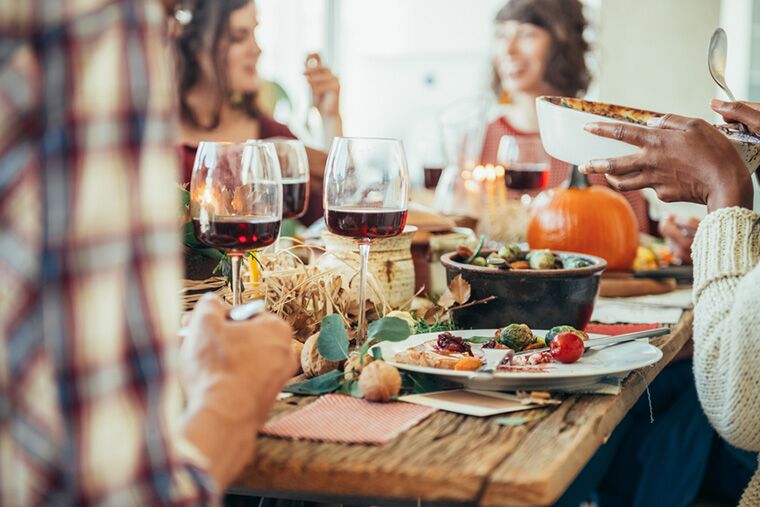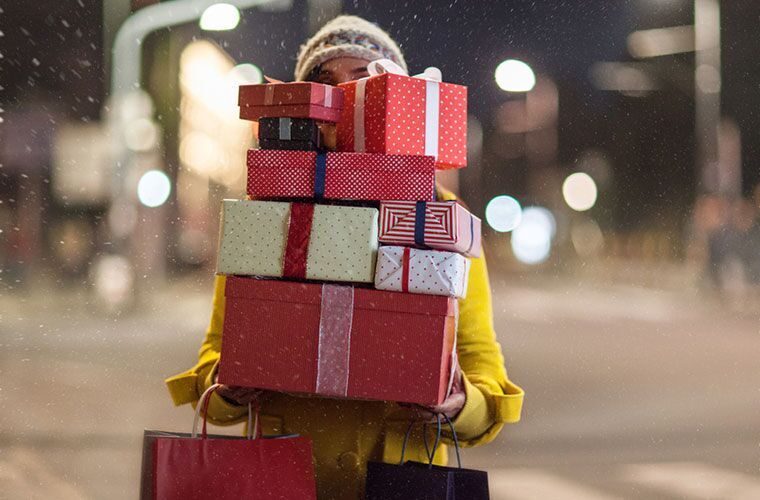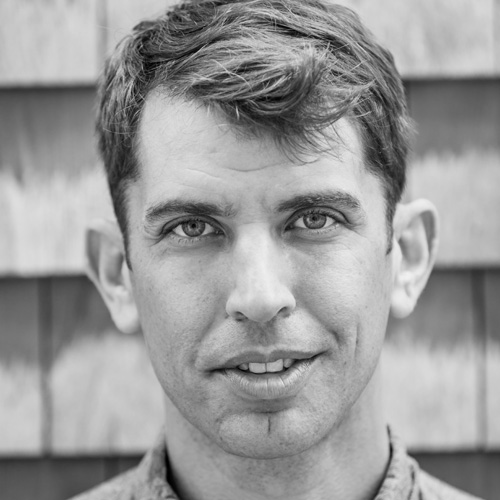What People *Really* Talk About With Their Psychiatrists During Holiday Season
The holiday season is in full swing, and everywhere you look, there's a reminder to make the days merry and bright. But what if the holidays make you experience stress, anxiety, loneliness, or other less-than-jolly feelings? That's not uncommon, according to brain health pro and psychiatrist Drew Ramsey, MD. Here, the Well+Good Council member identifies seven common emotions that pop up during the festive season—and how to deal with them so you can better enjoy things.
Every job has its season, and like the artists who dress the windows of Macy’s, the holiday season is high season for shrinks. So much comes up for us: the food. The family. The hopes.
So let’s talk holidays—because I’ve been getting a little sad over the state of the world. And maybe you have, too, so let’s get this off our collective chests. Holiday feelings are intense emotionally and tough to make sense of. The first step to processing complex feelings is describing them. Then we can strategize to help ensure a joyful season for all.
Here are 7 things people actually feel about the holidays—and what you can do about it.
1. Church (or synogogue, or mosque) anxiety
I've been thinking about the anxiety related to our often-neglected spiritual health. As places of worship fill up for the season, the "Yikes, I haven’t been in a while" kind of anxiety often rises. Now, as we gather together in the shadow of a string of mass shootings (including the November attack in Texas, which occurred in a church), our search for faith and peace is challenged by a vigilance. Is it safe to close our eyes and pray?

{{post.sponsorText}}
The anxiety related to terror seems immune to the usual remedy of evaluating odds and being rational. (For example, after the Halloween attack in New York City, I didn’t feel better trick-or-treating just because the odds were very low we’d be next.)
What works for me is feeling safe and present with others—and this year, you should consider where that will be for you. Remember, you are always welcome in a house of worship. The humanist streak that runs through all major religions means open arms for you. We need those arms now so badly.
2. Booze conflict
Celebrations should be joyful during the holidays, but parties can be especially hard for those struggling with alcohol, whether it's straight-up alcoholism or trying to cut back. One of my favorite sober patients recently told me there are not actually 12 steps, just three: Thanksgiving, Christmas, and New Year's.
So if you're newly sober, get a lot of support. Let people know about your sobriety and tell them why it's important to you. Get stakeholders who can help hold you accountable and support you.
If you are partaking, don't be that person pushing drinks. And if you hope for a more clear-eyed holiday season this year, stock up on delicious alternatives like kombucha cocktails. Think fizzy, fruity, festive mixes.

3. Overfed, under-nourished
The media calls January the season of “New Year, New You” because the old you is now 67 percent red meat, potatoes, holiday cookies, and wine. Nobody celebrates the holiday salad—but maybe this is the season you can change that. Years ago, we started eating pumpkin soup, purple potato casserole, and a kale salad with oranges and pepitas for our Christmas Eve dinner. We still have a big roast the next night, and it is much more enjoyable.
Here's a tip: Usually we say “moderation,” but that never works, right? This year, I invite you to aim for Food Joy. After all, guilt rarely helps anyone. Can you be in a state of Food Joyfulness? Can you do it all holiday season?
Drink when you want, eat what you want, but stay conscious about it. Want it for all the right reasons. For sure, spread the plant love and bring healthy sides to potlucks, work parties, or family meals. Try to add veggies to your plate wherever you can, and chew your food instead of wolfing it down. Remember leftovers (#turkeysandwichesfordays)! If you need some help with Food Joy, check out my new e-course, Eat To Beat Depression.
4. Nostalgia and loss
We miss those we love who have passed. Mourning is non-linear, and my patients are often surprised by the intensity of loss they feel. Holiday traditions revolve around people we love, and the mix of holiday cheer and re-activated mourning creates an emotional dissonance for us.
That's why I talk to dead people. This maybe isn’t a good thing to admit, but it calms me down. My aunt and I were the holiday planners: the big menus (this was before the pumpkin soup), the last-minute wrapping, our chatty gossip as we created a holiday experience for the whole family. Then, one year, breast cancer killed her in early December. Even as time passes and my holidays are filled with new wonders of my young kids and Santa, I find myself in the kitchen, kinda weepy. So I talk to her a bit in my mind and I try to enjoy the increased clarity of my memories of her. I like sensing her approval that we continue with joy.
5. Dread
The last-minute scramble. Not talking about your eggs, folks—this is your typical holiday week! The frantic present-buying. Winter travel home. Winter travel in the age of hysterical weather media. (Snowmageddon!) Meeting his family. (Be nice! Be fun! Impress his parents!) Ho-ho-hurl.
Here's a wild proposal: Do less this year. Your life has been on a setting of “too busy” since mid-2014. Enlist help. Make the meals simple. Express your concerns early. Who knows? You might find yourself actually looking forward to things.

6. Anger
When families get together, especially if they are in a tough spot, a lot gets acted out. This means instead of expressing difficult feelings, we act on them, often in very subtle and hostile ways. Meal sabotage is a common move, the favorite cranberry sauce "forgotten." Being emotionally shut down is another version of “No, I’m FINE.” Or maybe you're familiar with a difficult family member who seemingly shows up just to rile everyone else up? Ah, and then there's the regular ol' baseline simmering anger about the state of the world and the volume of hateful language engulfing us. Happy holidays, everybody!
Here's how to cope. Anger is a really useful feeling if you can listen to it. What is really making you angry? Can you say it in one sentence? I advise you try to stay clear to your True North: holiday connection and cheer. Say things simply and clearly. Sometimes words don’t help, or trying to talk makes a situation worse. This is why hugs were invented.
7. Too much merch
I just saw that Amazon has an entire section dedicated to ugly holiday sweaters. This season, how about saying enough to the ugly garbage, the drunk Santas, and all the stuff. This should be a simple time, one for us to reflect and connect. All that other junk is simply distracting yourself from the important matter at hand: celebrating the generous spirit of the season.
 As a psychiatrist and farmer, Dr. Drew Ramsey specializes in exploring the connection between food and brain health (i.e. how eating a nutrient-rich diet can balance moods, sharpen brain function, and improve mental health). When he’s not out in his fields growing his beloved brassica—you can read all about his love affair with the superfood in his book 50 Shades of Kale—or treating patients through his private practice in New York City, Dr. Ramsey is an assistant clinical professor of psychiatry at Columbia University College of Physicians and Surgeons.
As a psychiatrist and farmer, Dr. Drew Ramsey specializes in exploring the connection between food and brain health (i.e. how eating a nutrient-rich diet can balance moods, sharpen brain function, and improve mental health). When he’s not out in his fields growing his beloved brassica—you can read all about his love affair with the superfood in his book 50 Shades of Kale—or treating patients through his private practice in New York City, Dr. Ramsey is an assistant clinical professor of psychiatry at Columbia University College of Physicians and Surgeons.
What should Drew write about next? Send your questions and suggestions to experts@www.wellandgood.com.
Loading More Posts...